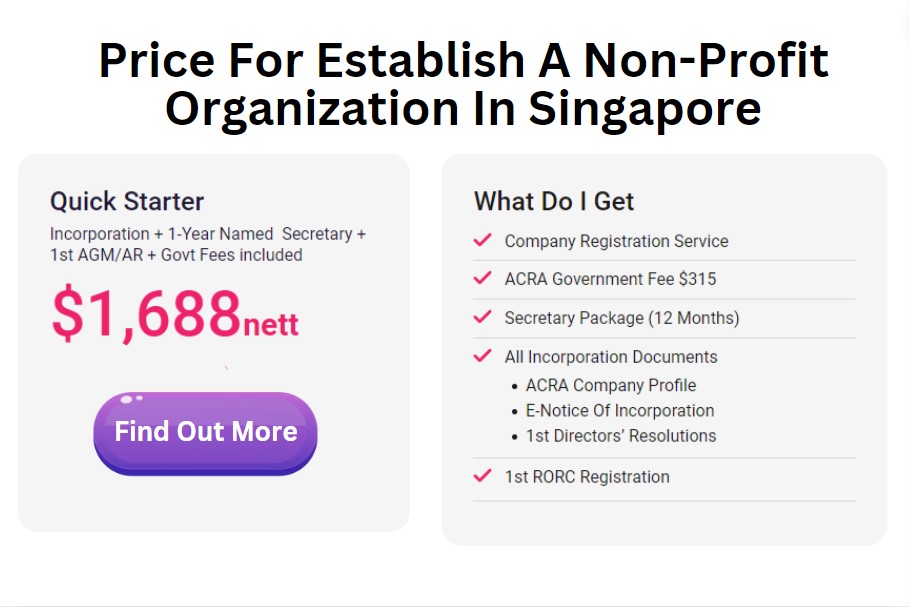Singapore is home to at least 140 non-profit organisations (NPOs), with more still on the horizon. Although the statutory obligations for registration and operations are demanding, many more NPOs are making Singapore their headquarters because of its global connectivity, business-friendly ecosystem, and multi-racial population. However, without registering with the appropriate authorities in Singapore, NPOs can hardly solicit funds from corporations and individuals, nor can they enter into any contractual agreement. You need to understand and keep a few things in mind before you start incorporating your non-profit organisation.
But, how do you go about setting up a non-profit organisation in Singapore? This detailed guide will shed light on it in a few lucid steps.
Step 1: Determine the registration type you want to adopt for your NPO.
There are three types of registration for non-profit organisations in Singapore, and they include:
- Public Company Limited By Guarantee
- Registration As A Society
- Registration As A Charitable Trust
NOTE: The choice of any of the above registration types is not a randomised experiment; it depends on certain factors such as anticipated legal liabilities, fundraising plans, and your NPO’s size and complexity. So, it will make sense to know what each entails and offers. Let’s briefly consider this.
Public Company Limited By Guarantee
If you choose to register your NPO in Singapore as a public company limited by guarantee, here are the implications:
- There can be no shareholders or share capital.
- Your entity is legally independent of the members operating it and can conduct transactions or legal actions under its own name.
- Your entity is not involved in any profit-making venture but is free to serve public and national interests.
- Your entity must carry the “limited” suffix unless you apply for its removal after incorporation.
Pros
- Limited members’ liability can be as low as SGD 1.
- Legally independent status.
- Tax exemption if there is a surplus coming from members or more than 50% of revenue is from members’ non-deductibles.
Cons
- You need a professional for statutory compliance and incorporation.
- Complex annual reporting.
- The entity’s activities are subject to statutory control and disclosure obligations.
Registration As A Society
Below are the implications of registering your entity as a society:
- You can register your Society quickly and at an affordable rate.
- Members bear the liability of the Society.
- Less preferred by donors.
- Tax exemption if surplus comes from members or more than 50% of revenue is from members’ non-deductibles.
Registration As A Charitable Trust
Although initiated by a founder/owner, the administration of trust lies with the trustees. For an NPO to qualify as a charitable trust, it has to be for a social cause and without the intention of profit. Below are the implications if you choose to register your NPO as a charitable trust:
- You are committed to structured giving to sustain the trust.
- The license is issued by the Monetary Authority of Singapore (MAS), and you must operate under the Singapore Trust Companies Act.
- Your trustees determine the beneficiaries of the charity and will administer accordingly.
Pros
- Extensive auditing and accounting reports to the public are not needed.
- Exemption from tax.
Cons
- The entity is not separate from the owner and trustees.
- There may be problems with accountability.
- Professional inputs are almost unavoidable when setting up a trust.
Step 2: Understand the requirements for your type of registration
So, once you decide what registration type best suits your vision for the non-profit entity, the next focus is to know the requirements. Here are the things you need for each of the three registration types.
Requirements For A Public Company Limited By Guarantee
- This registration type requires at least three members. As per Singapore’s regulations, one will be president, while one will be a qualified secretary, as per Singapore’s regulations.
- At least two members, including the secretary, must be Singapore residents or citizens.
- Articles of Association and a Memorandum clearly stating the entity’s objectives and by-laws must be drawn up.
- Annual auditing of accounts is mandatory.
- Yearly returns must be filed with the Accounting and Corporate Regulatory Authority (ACRA).
- Compulsory annual general meetings.
Requirements For A Society
- No less than ten people are needed to form a society.
- The key officers, namely, the president, secretary, and treasurer, must be residents of Singapore.
- Annual auditing of accounts is compulsory.
- A constitution stating officers’ roles and laws by which the Society operates must be drawn up.
- Annual returns must be submitted to the Registrar of Societies.
Requirements For A Charitable Trust
- There must be a board of trustees.
- There must be a trustee deed stipulating the trustees’ framework of operation.
Step 3: Reserve A Name For Your Entity
After you are certain of the registration type and requirements; the next vital step is to reserve your name. In connection with the name is your planned principal activity. You can go to ACRA’s website to see your entity’s most applicable principal activity and select it from the Singapore Standard Industrial Classification (SSIC) options while registering online.
Based on what your non-profit entity stands for and actually does, you may require further licensing from relevant bodies in Singapore. However, the registration can be performed online on ACRA’s website and shouldn’t take much time if you have all the necessary information on hand. Name reservation becomes invalid after 90 days if you fail to complete your entity’s registration.
Step 4: Get A Registered Office
All non-profit organisations in Singapore must have a registered office address, for which the use of a P.O. Box is not acceptable. Still, you can just get a mini space where your entity can operate. Moreover, except for large entities, daily transactions are rare for non-profit entities, making a small space acceptable for this purpose.
Step 5: Complete the Registration With Relevant Bodies
In Singapore, various bodies are responsible for the registration of non-profit entities. The process can take two weeks or more, depending on several factors. For societies, registration is with the Registrar of Societies (ROS), and it is relatively fast once you tick all the boxes. You need to obtain a license from the Monetary Authority of Singapore (MAS) for a charity trust. Usually, you would need a professional to help you clear all the hurdles for such a trust. ACRA is responsible for registering entities as a public company limited by guarantee.
Besides these statutory bodies, non-profit organisations may still have to seek further approval from other agencies. For instance, if your entity is a legal firm striving to provide legal services to the less-privileged pro bono, you may have to get approval from the Singapore Academy of Law. Similarly, NPOs that hope to do fundraising have to register with the Commissioner of Charity in Singapore.
Step 6: Apply For Charity Status
Upon completing registration with the relevant bodies, you may wish to get a charity status for your entity. This status qualifies your entity for tax exemption and places it in an advantageous position to raise funds. However, please note that not all NPOs can obtain a charity status because certain requirements have to be met. To achieve a charity status in Singapore, your NPO must focus on any of these four missions:
- Poverty alleviation
- Educational advancement
- Religious liberty
- Other purposes beneficial to the community
Applications for a charity status always go before the Commissioner of Charity, who determines whether the entity qualifies as a charitable organisation. The timeframe for registration is within three months of establishing your entity. Once your NPO acquires the charity status, it must comply with the following statutory regulations:
- Make fundraising information available online
- Hold annual general meetings
- Maintain proper accounting information and records
- Submit financial statements and annual returns
Step 7: Apply For Institution of a Public Character (IPC) Status
The last possible registration status for a non-profit organisation in Singapore is the IPC. The primary benefit of achieving this status is that qualified NPOs can receive tax-deductible donations from the government and donors. To qualify, your entity must have reached the charity status and be championing activities that benefit the whole community, not just a particular sect or segment. The entire application process can span up to two months or more. Once an entity achieves the IPC status, it has to comply with the following regulations:
- Maintain donation records
- Give donors Tax Deduction Receipts once it receives tax-deductible donations
- Keep information on all its financial operations available online
- Submit plans and disclose how donations received are spent
- Submit an annual return on donations
Wrapping Up
Non-profit organisations or entities in Singapore have prevailing statutory regulations and standards they must comply with. So, getting a professional to ensure compliance might be a reasonable investment in the long run. As we have seen, registration is not the only hurdle to cross; NPOs have to play by the rules if they hope to retain their status. Without professional assistance, an entity can quickly face a barrage of court cases, which are distracting and capable of rendering its mission useless.





